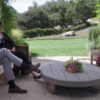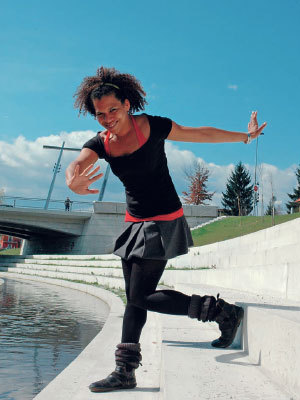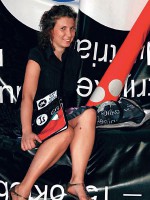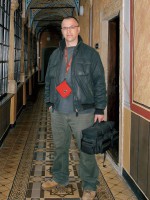Where did your love for dance come from? My mother, Jasna Knez, is a dancer and choreographer, so I lived with dance from an early age. From the age of four, I went with her to tours, to rehearsals in theaters, so all this was always familiar to me. Always with
Where did your love for dance come from?
My mother, Jasna Knez, is a dancer and choreographer, so I lived with dance from an early age. From the age of four, I went with her to tours, to rehearsals in theaters, so all this was always familiar to me. I have always been in touch with dancing and performing. She soon enrolled me in expressive dance. Dancing became my hobby. It was in high school that I first started thinking about dance as a career and not just a hobby.
When did you decide that dancing would become more than a hobby?
Indeed, it was a process. All along, little by little, everything was pointing to it. This fact became more apparent with my collaboration with the dance and theater group Bube led by Kim Komljanec. Since 1996, we have staged one show a year. After high school, I searched for a bit, but at the same time the demand for my performances increased, doors started opening for me in various projects. The trip to Paris was decisive, because that's when I came into contact with the school for traditional and contemporary African dances - ARTS SCENE. It was opened by dancer and choreographer Georges Momboye from the Ivory Coast, who lives and works in Paris. In addition to seminars, it also offers a two-year professional education. I decided that this would be my path. I auditioned and enrolled in school and graduated after two years.
Have you specialized in a certain type of dance over the years?
I never decided on just one dance genre. I have always combined several genres at the same time. I went to different modern dance techniques, to workshops of different African dance teachers. Expressive dance gives you some breadth, as it gives you the possibility of your own expression through movement; you experience the dance. It is mandatory to master the technique and one's own body. I am researching how I can express myself as best as possible with my body vocabulary. I do not define myself as a dancer of African dances or expressive dance. I'm trying to find my own movement.
What is the difference between this type of education here and abroad?
In our country, the possibility of education in the field of dance is limited. We have excellent dance studios, excellent dancers who teach, dance schools, but not at the level of university studies, if we exclude a school of classical ballet. In addition, there is no school of African dances as an institution in our country. Slowly things are moving for the better. Years ago, they also founded an art high school, and I hope that one day this will lead to the establishment of an academy. We have a lot of experienced dancers who gained their experience abroad. They are extremely broad and could offer a lot as teachers. The biggest problem here is that the dance scene does not have enough practice rooms. In Paris, all this is already established and established. You have the feeling that this is a really easy profession and that you can get the paper to do it. The whole experience was truly amazing. We worked very intensively for eight or more hours a day. After the first year, many of them dropped out of school because they couldn't keep up with the pace. Despite the efforts, a completely new world opened up to me, which I wanted to taste even more.
Has any show also influenced your work?
Dedication to spring as interpreted by my teacher Momboye. It was a mix of modern and African dance. He conjured up a special atmosphere and as a result I had goosebumps during the whole show.
Is the African way of dancing different from classical?
It is very difficult to articulate this difference. African dance is not one. There are as many dances as there are tribes in Africa. Everyone is different in their own way, especially if we focus on traditional dance. But they all have a common denominator. It is the rhythm that is present throughout, the softness of the movement despite the incredible speed and energy of the rhythm, the breath that passes through the body during the dance. But the knowledge of traditional dances and skills is increasingly passing into modern dance, so that the dividing line is increasingly blurred.
What does it take to become a good African dance dancer?
First of all, desire is needed... A lot of energy is needed, because this dance requires it from the dancer. But you also have to know the musical part, i.e. the rhythm. In Paris with African dances and in Africa, every dancer knows how to beat the music to which he dances, and every drummer knows how to dance what he drums.
Where can we learn to dance "African"?
At the moment, I lead an advanced dance class in Trnovo every Thursday and Sunday, and my friend Dalanda leads the beginner group on Wednesdays. The course lasts one hour and fifteen minutes. Sometimes drummers join us on the course, so we are never bored.
When do you especially enjoy applause?
That's when I know I've done my job well and I've done my best. It happens that after the performance you have an opinion that you could invest more in your performance. Even if I get a very big round of applause, it doesn't move me that much, because I secretly know that I can do more. And so it is with everything I do. I always demand the maximum from myself.
Which show can you recommend us to watch?
Make me dance, please! This is a performance by Rosana Hribar and Gregor Luštek at the Ljubljana Dance Theater. The monodrama Be Marilyn Monroe by Nebojša Pop Tasić, in which Karin Komljanec plays and for which I did the choreography, is also very interesting. In August, you can see an evening of Afro and flamenco music with the group Laafi and Kaña Flamenca.
Do you have a special way of pampering yourself?
I treat myself to a sauna and a massage. My friend and I are of the opinion that the state should subsidize this for dancers, as our bodies are constantly under great strain. Physiotherapy is also very welcome as I have back problems from time to time. I'm not picky about my diet. I really like to go to Trta with my boyfriend for pizza, and sometimes our journey also takes us to the bishop's.





